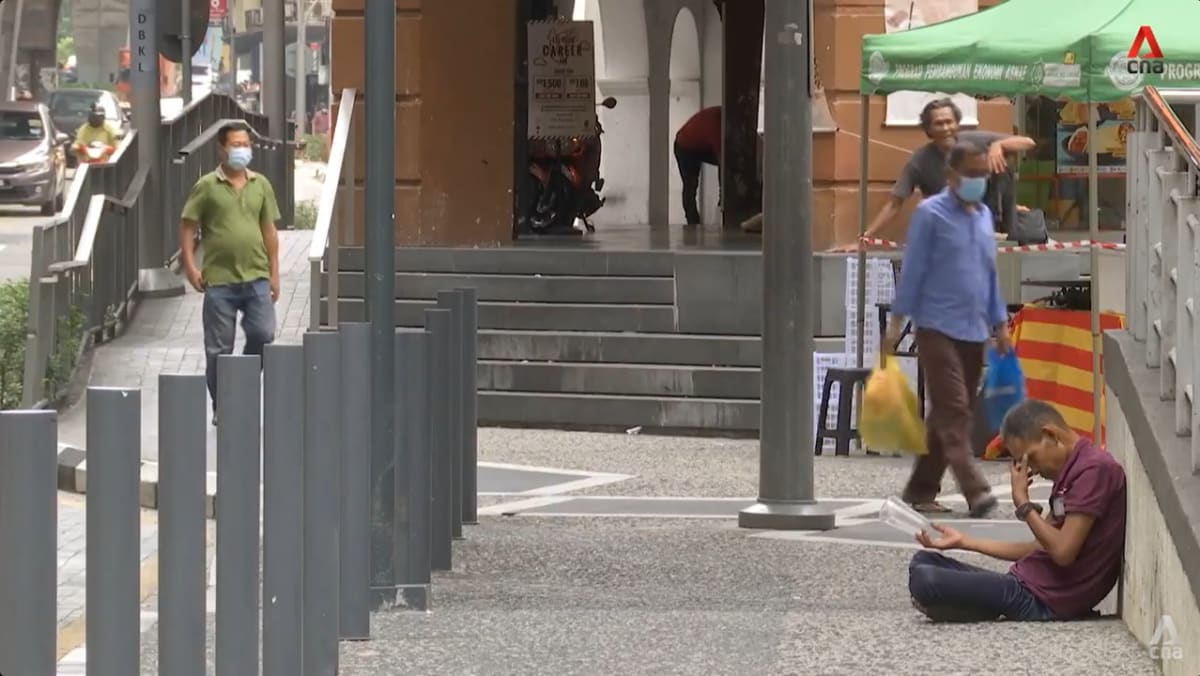KUALA LUMPUR: Norazlan Ismail can usually be found behind the wheel of his taxi. But in March, the 49-year-old set off on foot for the National Palace in Kuala Lumpur, from his home town in Johor.
He walked 312 kilometres in six days to deliver a message to the King: to tell Malaysian lawmakers to hear the cries of people like him, in need of financial help.
The father of five wanted the government to release monies from the Employees Provident Fund (EPF), Malaysia’s compulsory savings scheme. With an income of around RM80 (S$23) a day, he found it tough to support his family.
He had more than RM57,000 in his EPF account and hoped for a “last” round of withdrawals, after workers had previously been given dispensation to dip into their accounts to cushion the impact of the pandemic.
As early as February 2021, the EPF reported that about 30 per cent of members had emptied almost all their retirement savings in Account 1, which ordinarily cannot be withdrawn before age 55.
By the end of last year, 51.5 per cent of members under the age of 55 — nearly 6.7 million people — had less than RM10,000 in their accounts.
Based on the EPF’s calculations last year, only about 4 per cent of Malaysians could afford to retire. “It’s a reality today, to be honest,” said EPF chief strategy officer Nurhisham Hussein.
“Some of our members do fall into poverty at retirement or even before retirement because they don’t have the capacity to continue generating the kind of income they need.”
“Critical times require critical action. I don’t disagree with whatever decision that had been made by (then PMs) Muhyiddin (Yassin) and Ismail Sabri,” said Lee Chean Chung, the communications director of Parti Keadilan Rakyat, which was in the opposition then.
But others including Williams look on the decision as a “disastrous move”.
“It’s not the government’s money in the EPF, it’s people’s own money. So they had to use their own money to look after themselves during the lockdowns because the government wasn’t giving them sufficient direct cash transfers,” he said.
Institute of Malaysian and International Studies research fellow Muhammed Abdul Khalid did not mince his words. “(It) is the worst policy ever (that) the country has announced and implemented,” he said. “It’s irresponsible.”
EPF contributions — ordinarily, 11 per cent of monthly salary, with employers contributing another 12 to 13 per cent — are applicable to civil servants and formal employees in the private sector. Gig workers and freelancers are exempt, though they can make voluntary contributions.
And for many, it is a bit of a challenge making ends meet, let alone planning for retirement, via EPF contributions or otherwise.
WHAT CAN BE DONE?
The government is now exploring ways to boost income. The minimum monthly wage was raised to RM1,500 in May last year, and for micro enterprises, it came into force this July.
The government is also exploring a progressive wage model, and plans will be unveiled in future. “If done properly, this could be something (like what) is implemented in Singapore, where the wages are progressively increased,” cited Hafidzi.
But this, along with some other policies, will not bear fruit anytime soon.
“We can’t just say, ‘Let’s increase the wages of construction workers to RM3,000 tomorrow.’ The industry will collapse,” said Lee, who cited other economic restructuring being done to help workers.
“The government, through the energy transition road map, through our national investment policy master plan, is trying to revive the economy, so that we can all move to a higher value-added economy. … But that’ll take some time.”
“It’s not healthy for a multiracial country,” said Muhammed. “(Old-age poverty) is going to get much worse. … The amount (of social assistance) that the government has to give is going to be much increased.”
Some people have suggested higher EPF contribution rates. The latest Budget, meanwhile, included measures such as encouraging voluntary contributions and enhancing incentives for housewives.
In March, Anwar had also put forward a proposal on the use of retirement money as collateral to secure bank loans in emergencies. But this has come under fire from several quarters such as the opposition.
Malaysia’s household debt to GDP ratio is the second highest in the region after Thailand, pointed out Muhammed. “You want them to go and borrow some more? What’s the reason?”
There appears to be no quick fix or magic bullet that will solve the problem and turbocharge retirement savings. Nonetheless, he sees a window of opportunity for “reform” within the next 10 to 20 years.
He added: “In terms of educating the public on the need for saving for retirement, … we have a receptive audience. People do realise the importance of it. It’s just whether they have the capacity for it.”
Take, for example, 30-year-old Sukhvinder Singh, who delivers parcels to offices and residences in Kuala Lumpur.
He earns up to RM5,000 a month, which is enough to support himself and his elderly parents — in contrast to the days of COVID-19 restrictions.
He never made any EPF contributions before because of a lack of money, he said. But he has started to put money into his account voluntarily. His target: 30 per cent of income, although it has been a struggle.


